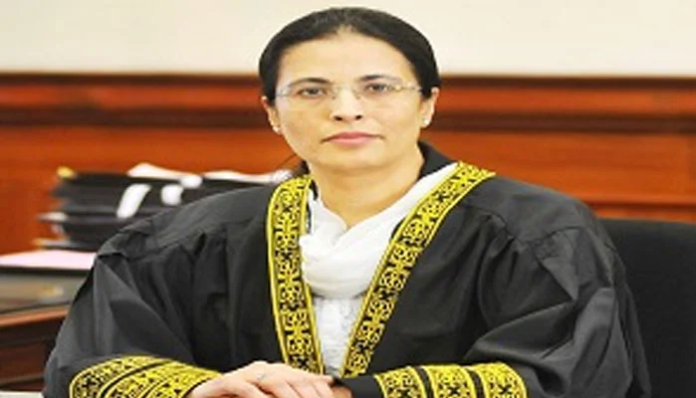ISLAMABAD, JAN 20 (DNA): Supreme Court’s Justice Ayesha Malik on Monday expressed confusion about how a chief justice alone could be more effective than multiple judges.
“How can a chief justice alone be better than three minds working together?” questioned Justice Ayesha.
The remarks came as she, along with Justice Mansoor Ali Shah, raised strong objections when a case scheduled before a three-judge bench was transferred.
The judges were hearing a case regarding the transfer of cases between the constitutional and regular benches against the backdrop of the three-member bench’s direction to the SC office for fixing the petitions regarding jurisdictions of the benches after the 26th Amendment to the same bench that was already hearing it.
The issue pertaining to the ambit and authority of the court’s benches emerged following the formation of the constitutional bench in the apex court under the 26th Constitutional Amendment.
The Judicial Commission of Pakistan (JCP), in November 2024, constituted a seven-member constitutional bench under Justice Amin-ud-Din Khan.
The bench, formed by a 7-5 split decision, also includes Justice Ayesha, Justice Muhammad Ali Mazhar, Justice Hassan Azhar Rizvi, Justice Jamal Khan Mandokhail, Justice Naeem Akhtar Afghan and Justice Musarrat Hilali.
During the hearing today, Justice Ayesha further criticised the practice, saying: “Are we now to be told by a research officer where a particular case should be heard? The committee has no authority to transfer a case.”
She also remarked, “Under the 26th Amendment, this case should go to the constitutional bench, and this discussion could have been held in our court as well.”
Meanwhile, Justice Mansoor, the senior puisne judge, added that the case had been moved to the administrative committee, and if Justice Irfan Saadat was busy, another judge could take his place on the bench.
He reiterated that the committee had no right to refuse to schedule the case. He further mentioned: “This case was not placed in any other court but has been completely removed altogether.”
Barrister Salahuddin brought up a similar case involving journalists, which had been taken up suo motu by the court.
At this, the lawyer said that the matter was supposed to be handled by the chief justice if a bench sent a case to him.
“I fail to understand how a single chief justice can be better than two or three minds working together,” Justice Ayesha responded.
The apex court also observed that it was clearly ordered to fix the case regarding the jurisdiction of the regular benches before the same bench on January 20 but the Registrar’s Office did not include it in the cause list for today.
The SC Registrar, when summoned, was not available to appear before the court due to a health issue.
The deputy registrar, however, appeared before the court and informed that the judges’ committee — responsible for allocating cases to various benches — has decided to fix this case before the constitutional bench on January 27.
Subsequently, the court issued a contempt of court notice to the Additional Judicial Registrar for failing to schedule cases related to the powers of constitutional and regular benches and directed him to appear before the court in person by tomorrow and explain his position.

















